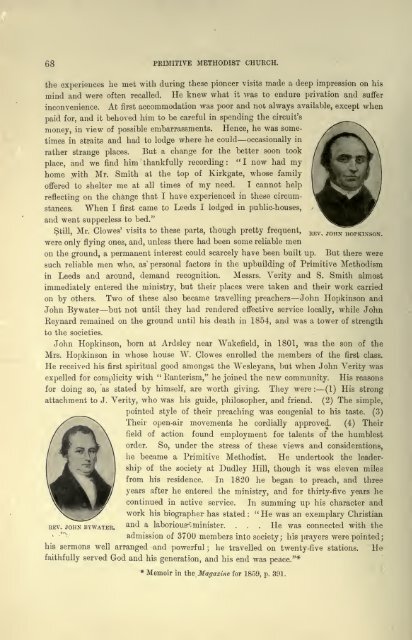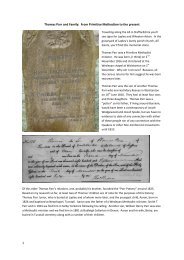Vol 2, pages 1-100 - My Primitive Methodist Ancestors
Vol 2, pages 1-100 - My Primitive Methodist Ancestors
Vol 2, pages 1-100 - My Primitive Methodist Ancestors
Create successful ePaper yourself
Turn your PDF publications into a flip-book with our unique Google optimized e-Paper software.
68 PRIMITIVE METHODIST CHURCH.<br />
the experiences he met with during these pioneer visits made a deep impression on his<br />
mind and were often recalled. He knew what it was to endure privation and suffer<br />
inconvenience. At first accommodation was poor and not always available, except when<br />
paid for, and it behoved him to be careful in spending the circuit's<br />
money, in view of possible embarrassments. Hence, he was sometimes<br />
in straits and had to lodge where he could occasionally in<br />
rather strange places.<br />
But a change for the better soon took<br />
place, and we find him thankfully recording: "I now had my<br />
home with Mr. Smith at the top of Kirkgate, whose family<br />
offered to shelter me at all times of my need. I cannot help<br />
reflecting on the change that I have experienced in<br />
these circumstances.<br />
When I first came to Leeds I lodged in public-houses,<br />
and went supperless to bed."<br />
Still, Mr. Clowes' visits to these parts, though pretty frequent, REV, JOHN HOPKINSON.<br />
were only flying ones, and, unless there had been some reliable men<br />
on the ground, a permanent interest could scarcely have been built up. But there were<br />
such reliable men who, as' personal factors in the upbuilding of <strong>Primitive</strong> Methodism<br />
in Leeds and around, demand recognition. Messrs. Verity and S. Smith almost<br />
immediately entered the ministry, but their places were taken and their work carried<br />
on by others. Two of these also became travelling preachers John Hopkinson and<br />
John Bywater but not until they had rendered effective service locally, while John<br />
Reynard remained on the ground until his death in 1854, and was a tower of strength<br />
to the societies.<br />
John Hopkinson, born at Ardsley near Wakefield, in 1801, was the son of the<br />
Mrs. Hopkinson in whose house W. Clowes enrolled the members of the first class.<br />
He received his first spiritual good amongst the Wesleyans, but when John Verity was<br />
expelled for complicity with " Ranterism," he joined the new community.<br />
His reasons<br />
for doing so, as stated by himself, are worth giving. They were: (1) His strong<br />
attachment to J. Verity, who was his guide, philosopher, and friend. (2) The simple,<br />
pointed style of their preaching was congenial to his taste. (3)<br />
Their open-air movements he cordially approved. (4) Their<br />
field of action found employment for talents of the humblest<br />
order. So, under the stress of these views and considerations,<br />
he became a <strong>Primitive</strong> <strong>Methodist</strong>. He undertook the leadership<br />
of the society at Dudley Hill, though<br />
it was eleven miles<br />
from his residence. In 1820 he began to preach, and three<br />
years after he entered the ministry, and for thirty-five years he<br />
continued in active service. In summing up his character and<br />
work his biographer has stated " : He was an exemplary Christian<br />
and a laborious-vminister. . .<br />
REV. JOHN<br />
.<br />
BYWATER.<br />
He was connected with the<br />
admission of 3700 members into society; his prayers were pointed;<br />
his sermons well arranged and powerful; he travelled on twenty<br />
-five stations. He<br />
faithfully served God and his generation, and his end was peace."*<br />
* Memoir in the Magazine for 1859, p. 391.



